
10 Tips For Delivering Professional Presentations

Many people describe presenting and public speaking as their greatest fears.
Like most things in life presenting is a skill. It has to be practised and developed over time, no-one is born a great presenter.
To help you learn to present effectively, we have distilled the art of presenting into 10 key points.
If you can master these 10 points you will be a better presenter than the vast majority of people, although uou will still have plenty to learn about making an effective presentation.
1. Use Author Or Speaker Notes
Speaker notes allow you to keep notes and statistics separate from your main slides.
They can act as a prompt when you’re delivering your presentation and save valuable time constantly turning back to view your screen.
Speaker notes can also help you prepare for any questions you may receive, and keep your presentation slides concise and to the point.
Many people create these writing notes on a print out of the PowerPoint outline view of their presentation.

2. Prepare And Plan
Plan and research your presentation before delivering it, prepare fully the material you are going to cover before creating the slide deck and keep your presentation as coherent as possible.
Speaker notes are important but don’t replace the need for practice.
Practice as much as possible before the presentation. Ideally, rehearse in front of a group of friends or family members to get their feedback.
Practice really does make perfect.
It also allows you to be confident that you’ll hit your time limit and not run over.
There is no worse end to a presentation than when the speaker is asked to wrap up by the organisers because they’ve overrun their time slot.
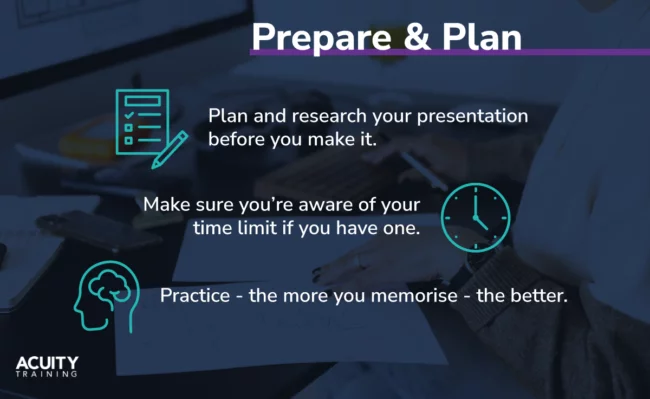
3. Focus On The Design
Eyes won’t just be on you!
The design of your presentation needs to be easy to read and understand and make key points very obvious.
Simple ways to improve your design which we cover during our PowerPoint courses include:
- Present important statistics as infographics
- Combine the written word with visual elements
- Make sure that your text is not too small
- Less is more – avoid background information and trivia
Keep in mind that colours evoke emotions.
For instance, blue supports better mind flow and performance and orange promotes better focus, concentration, and creativity.
Many companies use templates to ensure consistency, and speed up creating presentations as you can insert slides from other PowerPoint presentations.
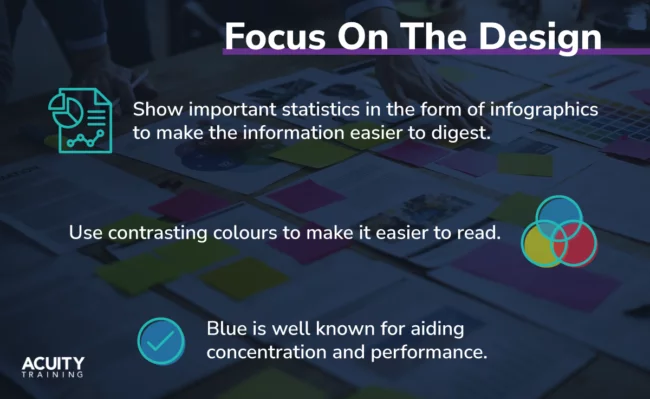
4. Know Your Audience
The point of a presentation is to communicate to a large number of people at the same time.
Spend some time thinking about your particular audience and how best to communicate with them.
- What level of knowledge do they already have?
- What are the key messages you want to communicate to them?
- How will they find the information most easily digested?
- What types of presentations are they used to?
Knowing your audience means you can communicate in the way that they will find easiest to understand.

5. Interactivity
People have short attention spans.
Their attention spans online (as opposed to in person) are even shorter.
Your presentation needs to be interactive to keep them engaged.
This means asking questions, encouraging audience participation (if possible) and breaking longer presentations into shorter sessions with breaks.
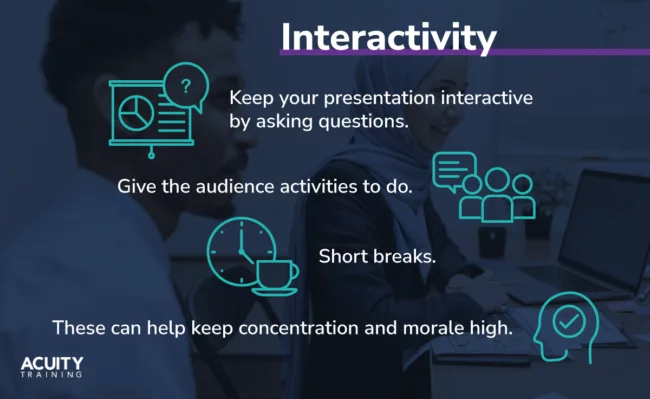
6. Know Your Technology
Practice using the technology before the day.
You don’t want to learning how to use Zoom or Teams with an audience watching!
Ideally, by the time you come to present you’ll have practised a fair few times and so navigating the technology will be second nature.
This means that you can concentrate on your presentation and and not be worrying about how to set up a video call or move to the next slide.
Obviously, if you’re presenting remotely make sure that you have a fast, stable internet connection.
If you’re using PowerPoint to present, then make sure to check our handy guide to computer shortcuts.
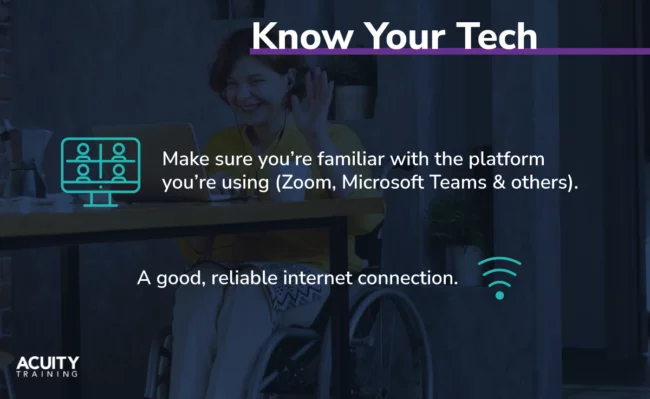
7. Dress Professionally
You would dress professionally if you were delivering a presentation in person.
Treat an online presentation in exactly the same way.
Even if you’re on the other side of a camera, people will still pay attention to what you’re wearing and how you act, so maintain a professional persona.
Wearing professional attire can also help boost your confidence!
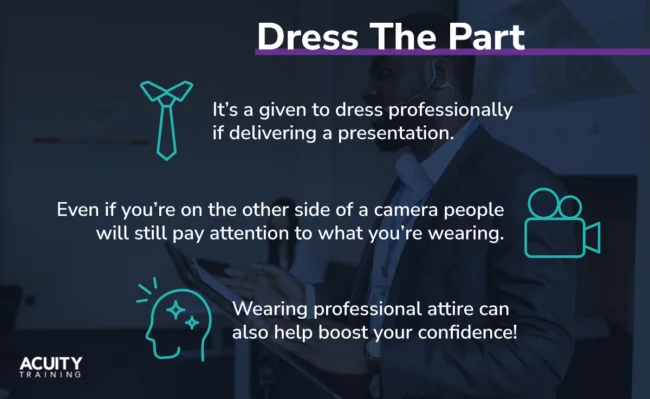
8. Is a Q&A Session Necessary?
This comes back to knowing your audience.
A more ‘informative’ presentation, such as a lecture should include a Q&A at the end.
Q&A sessions give you the chance to enrich and deepen listeners’ experience of your talk.
Conversely, if your time slot is very limited or you don’t feel that a Q&A session would add to the majority of your audience, you can always say that you’re available off-stage for any questions they might have, or host an online Q&A on a different platform, such as Twitter!
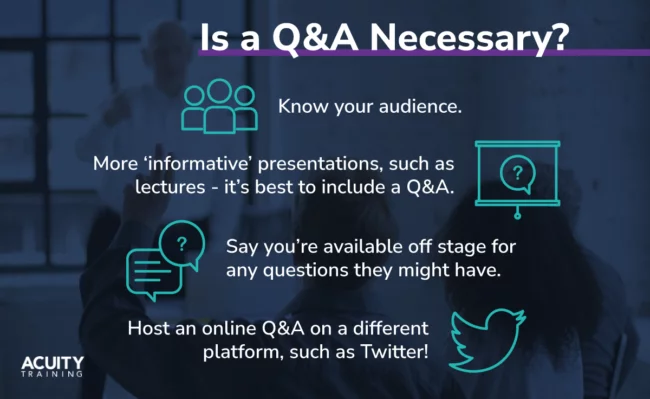
9. Create Presence
No matter who your audience is, they’ll still be expecting an approachable, (even slightly nervous) human being up on stage, or behind your computer screen.
Whether you’re delivering in-person or online, try to keep smiling and make eye contact with your audience.
Try to stay true to yourself while presenting; be authentic, interested, positive and most importantly, confident.
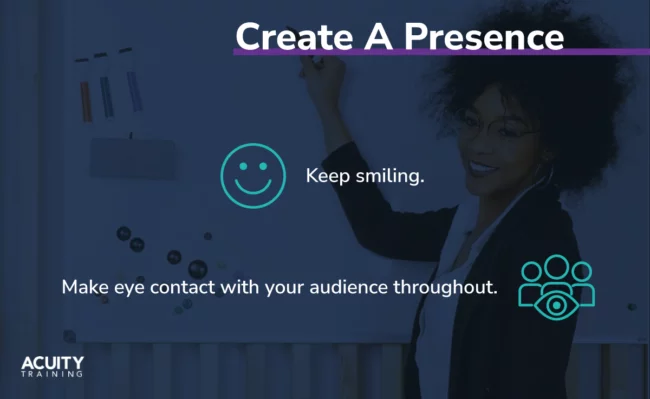
10. Create a Story
Human brains love stories.
People love to listen to stories and metaphors so try to work them into your presentation.
Facts are briefly interesting but stories are memorable.
Telling stories is essential because humans relate to them. Stories engage the audience, evoke empathy, increase trust and motivate action.
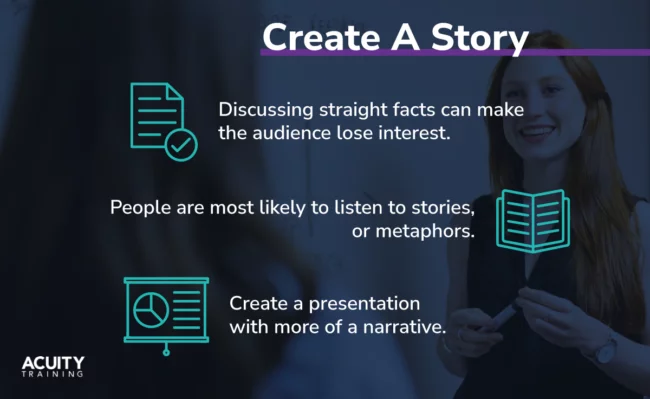
Our Final Thoughts
We know how daunting it can be to present in front of a group of people, whether in-person or remotely, so we hope that we have provided you with some helpful tips.
As with most skills in life a mixture of practice and some professional tips will help you develop your presenting skills.
Want to see how people are using PowerPoint today? Check out our PowerPoint statistics here!
